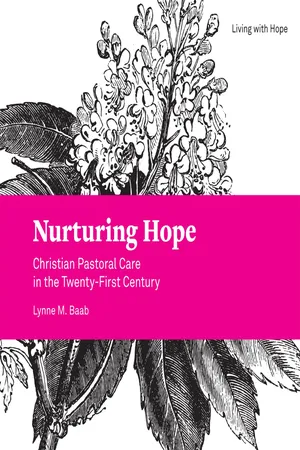For my PhD research in communication, I studied church websites. As I pored over dozens of websites, many things surprised me, and some of those surprises involved pastoral care. The websites seldom used the words “pastoral care” or mentioned one-on-one care offered by ministers or pastoral care teams. However, many congregational websites described activities that might fall under the umbrella of pastoral care or shepherding, where people might receive companionship, nurture, and guidance on their faith journey.
Several congregations I studied hosted support groups for adoptive parents, and one of them had three separate groups for parents who had adopted within the United States, from Asia, and from other countries around the world. I had never considered that the location of adoption would make a difference in the challenges for the adoptive parents, but with a few moments of reflection, I could imagine some of the issues parents might be dealing with. I was impressed by this level of care.
One congregation offered a support group for infertile couples. Several offered support groups for people who were grieving, and one congregation had a seminar in December about grief during the holidays. Several congregations offered classes in managing money and debt. I saw announcements on church websites for seminars on thriving with teenagers, helping aging parents, coping with chronic illness, and how to write a spiritual autobiography. Marriage enrichment opportunities included classes and seminars on marriage, marriage mentoring programs, the Marriage Course sponsored by Alpha, and various programs for engaged couples.
It was clear from the church websites that people from both within and outside the congregation would be welcome. The boundaries around congregations are increasingly porous, as more people attend church intermittently and as more families of churchgoers include people with different religious commitments who might come along with relatives to a church activity that interests them.
Many people hold a model of pastoral care involving an ordained minister visiting a parishioner in their home or having a conversation with a church member in the church office. That model stands in contrast with the patterns I observed on church websites—congregations’ porous boundaries, multiple and varied opportunities for learning and connection with others, and the many lay people who lead classes and groups.
| Bear one another’s burdens, and in this way you will fulfill the law of Christ. —Galatians 6:2 |
Definitions of Pastoral Care
If pastoral care is understood so broadly that it includes support groups for adoptive parents and recommendations from ministers for books on mindfulness meditation, what exactly is pastoral care? I argued in the introduction that Christian pastoral care today must include a faith-based perspective that sees pastoral care as soul care and that makes space for people to talk about God’s presence in daily life. Many writers argue that most Christians have an intuitive sense of what pastoral care is, but they say defining it precisely is quite difficult.
A landmark book, Pastoral Care in Historical Perspective, published in 1964, has been revised many times and is still in print and widely read. It was the first book to systematically analyze pastoral care over nineteen centuries of Christian history. The authors, William Clebsch and Charles Jaekle, propose a definition for pastoral care that has influenced at least two generations of ministers and pastoral carers: “Pastoral Care consists of helping acts, done by representative Christian persons, directed toward the healing, sustaining, guiding and reconciling of troubled persons whose troubles arise in the context of ultimate meanings and concerns.”
When I taught students about pastoral care, they latched on to the four verbs in the definition: healing, sustaining, guiding, and reconciling. In class discussion and essays, my students enthusiastically described and analyzed various forms of pastoral care ministry in the light of those verbs. Emmanuel Lartey, a seminary professor who writes about intercultural approaches to pastoral care, notes that another writer adds a fifth verb, nurturing. Lartey proposes adding two more verbs: liberating and empowering.
Because the Clebsch and Jaekle definition, with the possible addition of three more verbs, has influenced so many pastoral carers, the components of the definition are worth pondering in the light of shifts in pastoral care in the past few decades.
Stephen Pattison, a British pastoral theologian who has written widely about pastoral care, presents and discusses critiques of Clebsch and Jaekle’s definition. I draw on Pattison’s critiques below as I walk through the components of the definition. Many of these critiques I describe relate to the trends in pastoral care that are explored in the first half of this book.
First, note that the two authors view pastoral care as help “done by representative Christian persons.” When I was ordained as a Presbyterian minister in 1997, my view of pastoral care was strongly influenced by this perspective. I considered pastoral care to be actions done by a minister or the lay pastoral care team at the church where I worked. The lay carers on the team represented the congregation in some capacity, thus conveying to care recipients that the care was coming from the congregation in some semiofficial way.
| Be hospitable to one another. —1 Peter 4:9 |
I was surprised the first time I heard someone say, “Most pastoral care today happens in small groups”—the kinds of groups I later saw mentioned when I explored church websites. It took me quite a few years to wrap my mind around the clear truth that in congregations, small groups are the setting for a lot of healing, sustaining, guiding, reconciling, nurturing, liberating, and empowering.
Small-group members would not view themselves as “representative persons” of their congregation, and they would probably not use the words “pastoral care” for the way they support each other, yet they provide so much care, as do congregation members in many other settings when they engage in a nurturing way with each other. Therefore, the notion of pastoral care being delivered only or mostly by “representative persons” is no longer accurate.
Second, looking again at the Clebsch and Jaekle definition, consider the use of the words “troubled persons” to describe pastoral care recipients. What about the person who wants to pray more deeply or love a spouse more consistently? Must that person be viewed as “troubled” in order to receive pastoral care?
| Much of the task of pastoral care is to help people see where God is already at work and how they can join in. |
Eugene Peterson believes that we limit pastoral ministry when we focus it only on people who we perceive to be troubled. Rather, much of the task of pastoral care is to help people see where God is already at work and how they can join in.
Peterson recommends that pastoral carers ask “cure of soul” questions like: “What has God been doing here? What traces of grace can I discern in this life? What history of love can I read in this group? What has God set in motion that I can get in on?” These questions show that sometimes pastoral carers have the great privilege of nurturing people in situations where good things are already happening.
Third, look at the closing phrase of the definition: “whose troubles arise in the context of ultimate meanings and concerns.” Personally, I like nothing better than talking with people about ultimate meanings and concerns, and Christian pastoral care often includes deep conversations that may help people trust and pray to the God in whom we find ultimate meaning. But what about someone who can’t pay a utility bill because of an unexpected job layoff? What about someone who is just home from the hospital and can’t cook dinner? Helping a person with dinner or a utility bill is not excluded from pastoral care just because the troubles did not arise in an area of ultimate significance.
| Helping a person with dinner or a utility bill is not excluded from pastoral care just because the troubles did not arise in an area of ultimate significance. |
A fourth concern about the Clebsch and Jaekle definition relates to the individualism implicit in the definition. Much pastoral care does involve helping individuals, but often pastoral care also involves families, extended families, neighborhoods, and communities. Sometimes pastoral care involves considering social-justice issues that are rooted in situations involving many people.
In response to the Clebsch and Jaekle definition of pastoral care, Pattison proposes his own definition, saying that “pastoral care is that activity, undertaken especially by representative persons, directed toward the elimination and relief of sin and sorrow and the presentation of all people perfect in Christ to God.”
His phrase “elimination and relief of sin and sorrow” relates to the pain and struggles so many pastoral care recipients experience, and can include both individuals and groups of people. His words “the presentation of all peopl...

